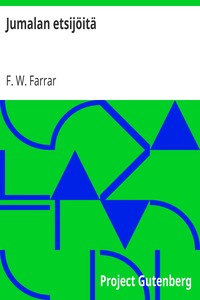Jumalan etsijöitä by F. W. Farrar
"Jumalan etsijöitä" by F. W. Farrar is a philosophical account written in the early 20th century. The book explores the lives and ideas of three prominent pagan philosophers—Seneca, Epictetus, and Marcus Aurelius—who sought truths that could make their lives more righteous in a morally corrupt society. By labeling them as "God seekers," it suggests a pursuit of ethical living that transcends the boundaries of traditional religious thought. The opening of the work
sets the stage for a thoughtful exploration of these philosophers' contributions and their struggles to find meaning and virtue in an imperfect world. Farrar emphasizes the richness of their insights, highlighting that despite their pagan backgrounds, their moral teachings resonate with and can challenge contemporary understandings of virtue. He notes that the book will delve into each philosopher's life, starting with Seneca, while also painting a broader picture of the historical and societal context in which these thinkers operated, hinting at the intersections between philosophy and early Christian thought that are to unfold in subsequent chapters. (This is an automatically generated summary.)
Read or download for free
| How to read | Url | Size | |||
|---|---|---|---|---|---|
| Read now! | https://www.gutenberg.org/ebooks/58481.html.images | 602 kB | |||
| EPUB3 (E-readers incl. Send-to-Kindle) | https://www.gutenberg.org/ebooks/58481.epub3.images | 302 kB | |||
| EPUB (older E-readers) | https://www.gutenberg.org/ebooks/58481.epub.images | 310 kB | |||
| EPUB (no images, older E-readers) | https://www.gutenberg.org/ebooks/58481.epub.noimages | 304 kB | |||
| Kindle | https://www.gutenberg.org/ebooks/58481.kf8.images | 541 kB | |||
| older Kindles | https://www.gutenberg.org/ebooks/58481.kindle.images | 515 kB | |||
| Plain Text UTF-8 | https://www.gutenberg.org/ebooks/58481.txt.utf-8 | 572 kB | |||
| Download HTML (zip) | https://www.gutenberg.org/cache/epub/58481/pg58481-h.zip | 299 kB | |||
| There may be more files related to this item. | |||||
Similar Books
About this eBook
| Author | Farrar, F. W. (Frederic William), 1831-1903 |
|---|---|
| Translator | Impiwaara, Heikki, 1876-1964 |
| Uniform Title | Seekers after God. Finnish |
| Title | Jumalan etsijöitä |
| Contents | Esipuhe -- Seneca -- Epiktetos -- Marcus Aurelius -- Loppusana. |
| Credits | Produced by Tapio Riikonen |
| Reading Level | Reading ease score: 24.5 (College graduate level). Very difficult to read. |
| Language | Finnish |
| LoC Class | B: Philosophy, Psychology, Religion |
| Subject | Marcus Aurelius, Emperor of Rome, 121-180 |
| Subject | Seneca, Lucius Annaeus, approximately 4 B.C.-65 A.D. -- Religion |
| Subject | Epictetus |
| Category | Text |
| EBook-No. | 58481 |
| Release Date | Dec 16, 2018 |
| Copyright Status | Public domain in the USA. |
| Downloads | 199 downloads in the last 30 days. |
| Project Gutenberg eBooks are always free! | |

